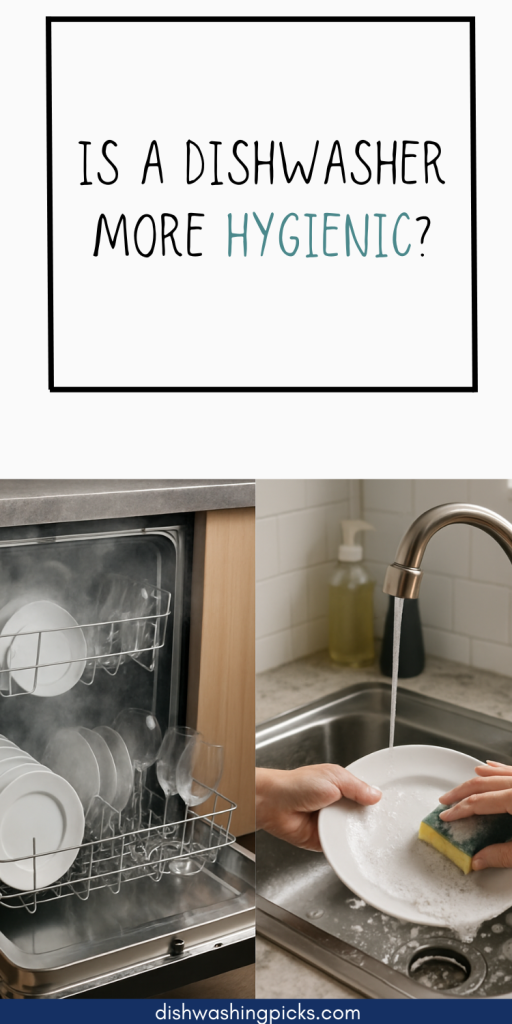
Let’s Talk Germs, Grime & Good Ol’ Dishwashing
Let’s be honest—nobody wakes up excited to tackle a mountain of dirty dishes. Some people swear by hand-washing (maybe because that’s what their grandma did), while others trust their high-tech dishwasher to handle the mess. But when it comes to hygiene, things get interesting.
So here’s the question:
Is a dishwasher actually more hygienic than hand-washing?
If you’ve ever wondered whether you’re scrubbing your dishes clean or just moving bacteria around, you’re not alone. Let’s dive in—germs first.
Heat, Water, and a Germ-Free Zone
Okay, picture this: You’re hand-washing your dishes in warm water. But not hot-hot water. It’s maybe… lukewarm? At best, your hands can tolerate water up to about 40°C (104°F).
But guess what? Most modern dishwashers?
They crank the heat up to 60–70°C (140–160°F). That’s hot enough to kill most bacteria, including E. coli and Salmonella—the usual suspects when we’re talking about foodborne illness.
So unless you’re wearing heatproof gloves and scrubbing in near-boiling water (ouch), your dishwasher has a hygiene edge just on temperature alone.
Try thinking of it this way:
Your hands are good at feeling clean.
Your dishwasher is good at actually making it clean.
Who’s the Real Culprit?
Let’s talk sponges. The friendly little yellow guy sitting by your sink? Yeah, he’s not so innocent.
Sponges are bacteria breeding factories. Studies have found they can hold more bacteria than a toilet seat. Yep. You read that right.
When you scrub multiple plates and pots using the same old sponge (especially without changing it weekly), you’re potentially just spreading bacteria around.
On the flip side? Dishwashers have separate water jets and cycles designed to keep water moving away from clean dishes. Translation? Less cross-contamination.
Imagine this: You just cleaned a cutting board used for raw chicken. Would you trust a quick hand rinse with cold water and a sponge? Or a high-temp wash cycle and detergent combo designed to sanitize?
Exactly.
The Unsung Heroes
Here’s something else you might not think about: dishwasher detergents are stronger than regular dish soap. They’re specifically made to break down dried food, grease, and kill bacteria.
And then there’s the rinse aid, which helps dry the dishes faster—less moisture = less chance for bacteria to grow afterward.
Hand-washed dishes? Unless you’re towel-drying (and who knows how clean that towel really is), you’re probably air-drying on a rack. That moist surface is basically an invitation for bacteria to set up camp.
But Wait… It’s Only Hygienic If You Use It Right
Now, just because dishwashers can be more hygienic doesn’t mean they automatically are. There’s a bit of dishwasher etiquette involved:
- Don’t overload it. Cramped dishes won’t get fully cleaned.
- Use the right detergent (and the right amount).
- Clean your filter and spray arms regularly.
- Run the sanitize or hot water cycle when needed.
So yeah, the dishwasher’s the champ—but only if you let it fight with all its tools.
Real-Life Example: The Sick Day Scenario
Imagine this: You just got over a nasty stomach bug. You’re cleaning up plates, glasses, and cutlery used during that whole episode.
Now, are you going to trust a quick hand rinse to make those safe again? Or toss everything into a dishwasher with high-temp sanitization?
If you said “dishwasher,” congrats—you just avoided a potential re-infection.
That’s not just convenience. That’s smart hygiene.
The Verdict?
So, is a dishwasher more hygienic? Yes—when used properly, it’s way ahead of hand-washing.
From hotter water to smarter detergent to fewer germs hiding in sponges, it’s the more sanitary choice for daily dish duty.
Does that mean you have to ditch hand-washing altogether? Of course not. But for full loads, especially after big meals or illness, dishwashers are the hygiene MVP.
